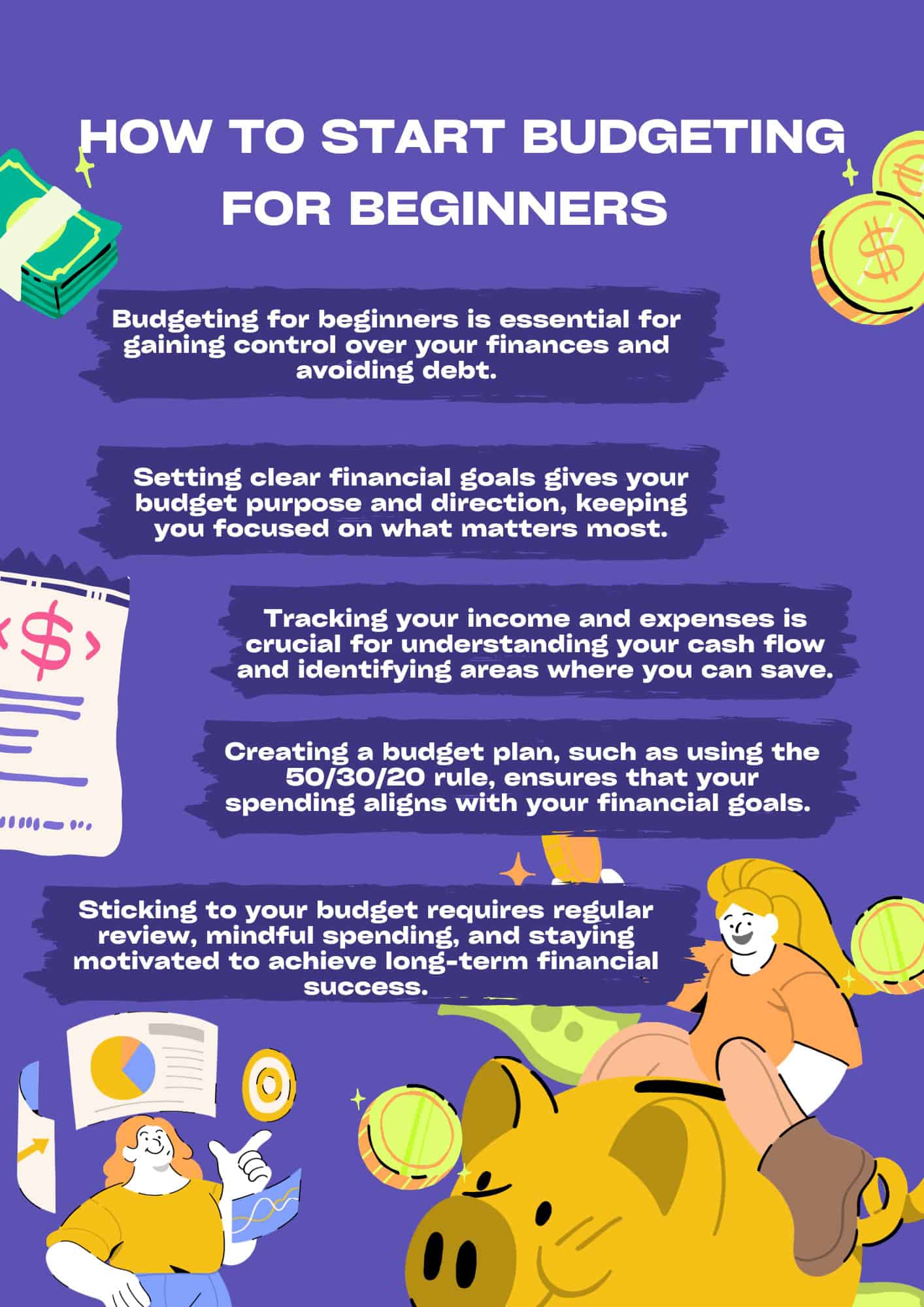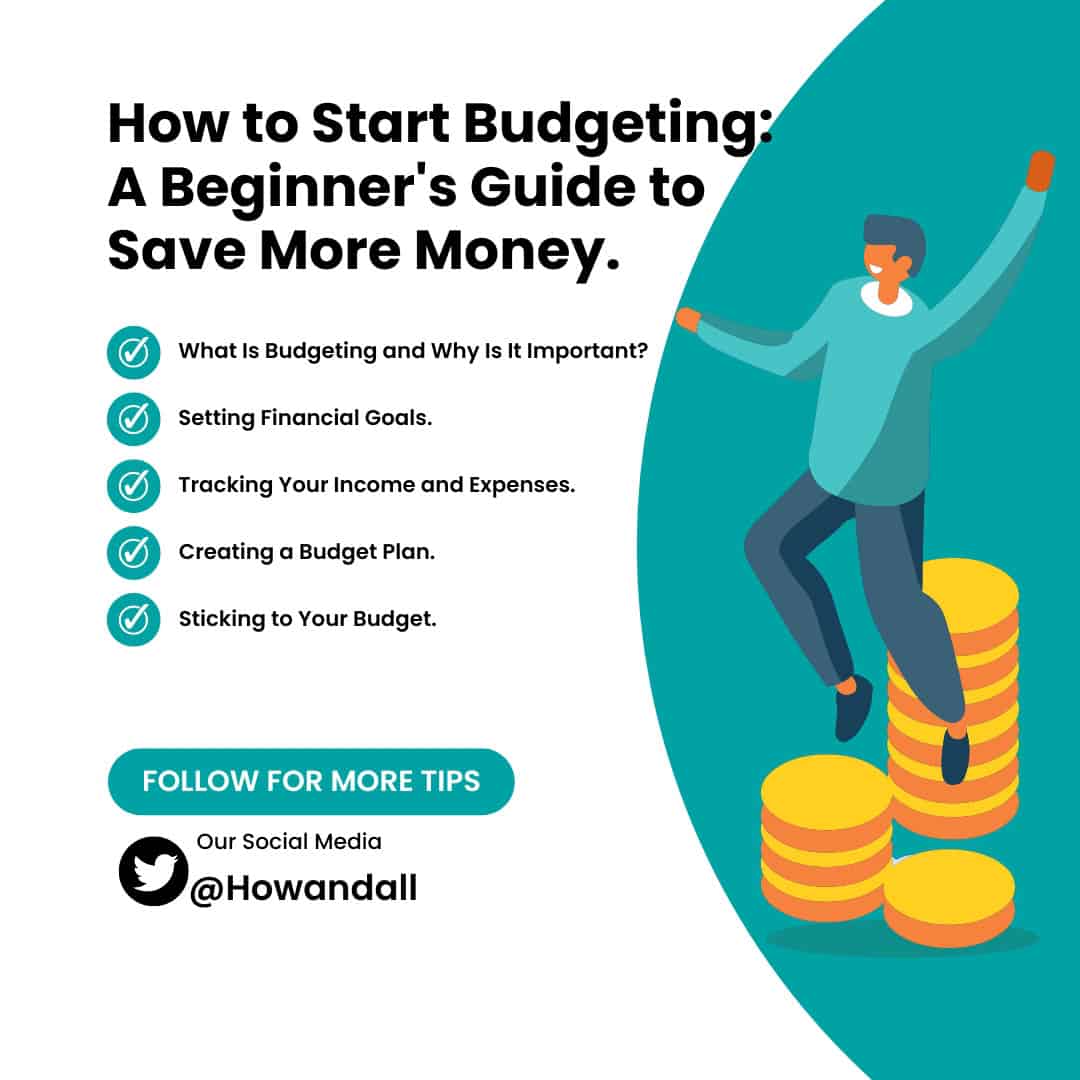
How to Start Budgeting: A Beginner’s Guide to Save More Money.
-
by admin
- 0
Have you ever felt overwhelmed by your finances, wondering where all your money goes each month? You’re not alone. budgeting for beginners is a struggle to manage their money effectively, often feeling like they’re living paycheck to paycheck without any real control over their financial situation. The solution lies in a simple yet powerful tool: budgeting.
Budgeting can transform your financial life, allowing you to save more money, reduce unnecessary expenses, and achieve your long-term financial goals. But if you’re new to budgeting, it can seem intimidating. Where do you even begin? This beginner’s guide to budgeting will break down the process into manageable steps, offering practical advice on how to start budgeting, even if you’ve never done it before. By the end of this article, you’ll have the knowledge and confidence to take control of your finances and start saving more money today.
Understanding Budgeting for Beginners.

1. What Is Budgeting and Why Is It Important?
Making a program for how you’ll give and save your plutocrat is known as budgeting. This plan, known as a budget, is essential for anyone who wants to take control of their finances. Without a budget, it’s easy to lose track of where your money is going, leading to overspending and financial stress. For beginners, budgeting is particularly important because it provides a clear roadmap for managing your money, ensuring that you can meet your needs, save for the future, and avoid unnecessary debt.
Budgeting for beginners doesn’t have to be complicated. At its core, a budget is simply a tool that helps you allocate your income to cover your expenses while setting aside money for savings and future goals. By understanding where your money is going each month, you can make informed decisions about how to spend and save, ultimately leading to greater financial security and peace of mind.
2. Setting Financial Goals.
Before you start creating a budget, it’s important to have a clear understanding of what you want to achieve with your money. Setting financial goals gives your budget purpose and directions, helping you stay motivated and focused on what matters most to you. Financial goals can be short-term, such as saving for a new phone or paying off a small debt, or long-term, like buying a house or retiring comfortably.
To set effective financial goals, start by asking yourself what you want to accomplish in the next few months, years, and decades. Prioritize your pretensions by authoring them down in order of significance and urgency. For example, if you’re currently carrying high-interest debt, paying it off should be a top priority. If you’re already debt-free, you might focus on building an emergency fund or saving for a major purchase.

Once you have your goals in mind, you can begin to tailor your budget to help you achieve them. For beginners, it’s important to start with realistic, achievable goals. As you gain confidence in your budgeting skills, you can set more ambitious targets and adjust your budget accordingly.
3. Tracking Your Income and Expenses.
One of the most crucial steps in budgeting for beginners is understanding your cash flow. This means tracking your income and expenses to see exactly where your money is going each month. Without this knowledge, it’s impossible to create an effective budget.
Start by listing all sources of income, including your salary, freelance work, side jobs, and any other earnings. Be sure to account for all sources of income, no matter how small or irregular. Next, track your expenses. This includes fixed costs like rent, utilities, and insurance, as well as variable expenses like groceries, entertainment, and dining out.
Many beginners find it helpful to use budgeting apps or spreadsheets to keep everything organized. These tools can make it easier to categorize your expenses and identify patterns in your spending. For example, you might discover that you’re spending more on dining out than you realized or that your monthly utility bills are higher than expected. By tracking your income and expenses, you can gain a clear understanding of your financial situation and identify areas where you can cut back or make adjustments.
Also read “How life changing decentralized finance (Defi) work ?”
4. Creating a Budget Plan.
With your financial goals set and your income and expenses tracked, it’s time to create a budget plan. A budget plan is essentially a detailed map of how you will allocate your income to cover your expenses while also saving for your goals.
One of the most popular budgeting methods for beginners is the 50/30/20 rule. This rule suggests allocating 50% of your income to needs, 30% to wants, and 20% to savings and debt repayment.
Let’s break this down:
- Needs (50%): These are essential expenses that you must cover to maintain your basic standard of living. This includes rent or mortgage payments, utilities, groceries, insurance, transportation, and healthcare costs.
- Wants (30%): These are non-essential expenses that make life more enjoyable but aren’t necessary for survival. This could include dining out, entertainment, hobbies, travel, and other discretionary spending.
- Savings and Debt Repayment (20%): This portion of your budget should be dedicated to building an emergency fund, saving for retirement, and paying off debt. If you have high-interest debt, such as credit card balances, it’s often wise to prioritize debt repayment to avoid paying more in interest over time.
If the 50/30/20 rule doesn’t fit your financial situation, feel free to adjust the percentages to better align with your needs and goals. The key is to create a plan that balances your spending and saving in a way that supports your financial well-being.
5. Sticking to Your Budget.
Making a account is only the first step; the true difficulty is in staying within it. Many beginners struggle to stay within their budget, especially when faced with unexpected expenses or the temptation to overspend. However, with a few strategies, you can increase your chances of success.
- Review and Adjust Regularly– Your financial situation is likely to change over time, so it’s important to review your budget regularly and make adjustments as needed. For example, if you receive a raise at work, you might choose to allocate more money to savings or debt repayment. Conversely, if you encounter a financial setback, such as an unexpected medical bill or car repair, you may need to cut back in other areas to stay on track.
- Use Budgeting Tools– There are many budgeting tools available that can help you stay on top of your finances. Budgeting apps, like Mint, YNAB (You Need A Budget), or Every Dollar, offer features like expense tracking, goal setting, and bill reminders, making it easier to manage your money and stick to your budget. Many of these tools also allow you to link your bank accounts, so you can automatically import transactions and see a real-time view of your financial situation.
- Practice Mindful Spending– One of the biggest challenges in sticking to a budget is resisting the urge to overspend on non-essential items. To combat this, practice mindful spending. This means being intentional about your purchases and asking yourself whether you really need something before buying it. By being more conscious of your spending habits, you can avoid impulse buys and stay within your budget.
- Stay Motivated– Staying motivated to stick to your budget can be difficult, especially if you don’t see immediate results. To stay on track, keep your financial goals in mind and remind yourself of the benefits of budgeting. Whether it’s paying off debt, saving for a vacation, or building an emergency fund, focusing on your long-term goals can help you stay committed to your budget.
Conclusion
Budgeting is the cornerstone of financial success, especially for beginners. By understanding the basics of budgeting, setting clear financial goals, tracking your income and expenses, creating a budget plan, and sticking to it, you can take control of your finances and build a more secure financial future. The journey to financial freedom starts with a single step, and this beginner’s guide has provided you with the tools and knowledge you need to get started. Remember, budgeting is a skill that improves with practice, so be patient, stay committed, and watch your savings grow over time.

Best 5 Key Takeaways
1. Budgeting for beginners is essential for gaining control over your finances and avoiding debt.
2. Setting clear financial goals gives your budget purpose and direction, keeping you focused on what matters most.
3. Tracking your income and expenses is crucial for understanding your cash flow and identifying areas where you can save.
4. Creating a budget plan, such as using the 50/30/20 rule, ensures that your spending aligns with your financial goals.
5. Sticking to your budget requires regular review, mindful spending, and staying motivated to achieve long-term financial success.
Have you ever felt overwhelmed by your finances, wondering where all your money goes each month? You’re not alone. budgeting for beginners is
Have you ever felt overwhelmed by your finances, wondering where all your money goes each month? You’re not alone. budgeting for beginners is